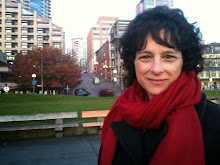As imagined, it is a harsh life. On the island of Kivalina there is no running water. There is very little room to build homes for growing families and the island, due to climate change, is shrinking. The community knows what the next move must be, where to migrate, how to save the culture, but there are voices that tell them "no" - voices telling them to go elsewhere. That elsewhere (far north of the village and ocean) does not include a life the tribe has lived for hundreds of years; a life of subsistence, a life of rhythm.
I, being from L.A., only a visitor, made my way to Fairbanks today, on to another set of interviews. I sat in a bar (non-existent in Kivalina) next to a man from Illinois. He asked why I was here, whether I was a tourist. I said "no" I was working on a documentary on climate change. He wasn't impressed. I could tell that he, being from Illinois, a cold state, didn't put much stock in the concept. "Is that what they tell you?" he asked. "No" I answered, "that's what they're living."
And then he made me smile sadly, ironically, inside. "Why don't they just come down here if it's that tough? If life is hard, why don't they move south?" I realized his beer wasn't deep enough to dive into the the fact that some of them had tried that. Had been to Florida. Had been to Nevada. Deep warm states. They went back north. Why? Because of the heat? No. Because they couldn't find jobs.
In Kivalina, meat is the price of gas for the boat. When you catch it, or kill it, it feeds an entire village. In Kivalina, life is lived for others.


No comments:
Post a Comment